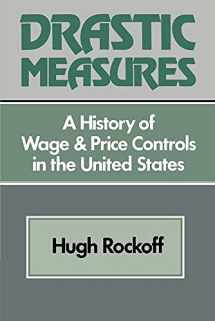
Drastic Measures: A History of Wage and Price Controls in the United States (Studies in Economic History and Policy: USA in the Twentieth Century)
ISBN-13:
9780521522038
ISBN-10:
052152203X
Author:
Hugh Rockoff
Publication date:
2004
Publisher:
Cambridge University Press
Format:
Paperback
304 pages
Category:
Economic History
,
Economics
,
Labor & Industrial Relations
,
United States History
FREE US shipping
Book details
ISBN-13:
9780521522038
ISBN-10:
052152203X
Author:
Hugh Rockoff
Publication date:
2004
Publisher:
Cambridge University Press
Format:
Paperback
304 pages
Category:
Economic History
,
Economics
,
Labor & Industrial Relations
,
United States History
Summary
Drastic Measures: A History of Wage and Price Controls in the United States (Studies in Economic History and Policy: USA in the Twentieth Century) (ISBN-13: 9780521522038 and ISBN-10: 052152203X), written by authors
Hugh Rockoff, was published by Cambridge University Press in 2004.
With an overall rating of 3.7 stars, it's a notable title among other
Economic History
(Economics, Labor & Industrial Relations, United States History) books. You can easily purchase or rent Drastic Measures: A History of Wage and Price Controls in the United States (Studies in Economic History and Policy: USA in the Twentieth Century) (Paperback) from BooksRun,
along with many other new and used
Economic History
books
and textbooks.
And, if you're looking to sell your copy, our current buyback offer is $0.3.
Description
This is a history of America's use of wage and price controls from colonial times to Richard Nixon's experiment with controls in the 1970s. It explores the impact of controls on prices and productivity, side-effects such as the growth of black markets and the expansion of government, and the relationship between controls and monetary policy. The central conclusion is that, contrary to the conventional wisdom, there are situations where the net effect of controls can be positive. In particular, temporary controls may reduce the unemployment and lost output usually associated with disinflation.


We would LOVE it if you could help us and other readers by reviewing the book
Book review

Congratulations! We have received your book review.
{user}
{createdAt}
by {truncated_author}


